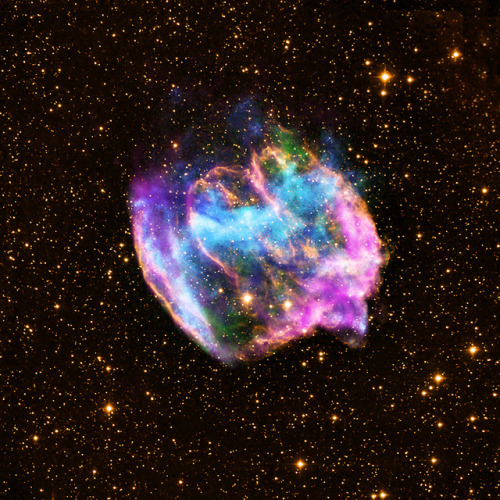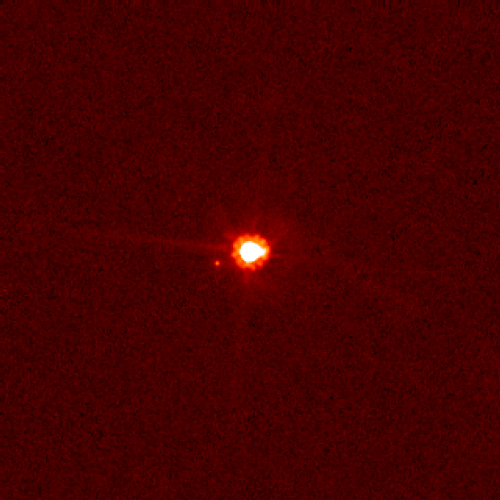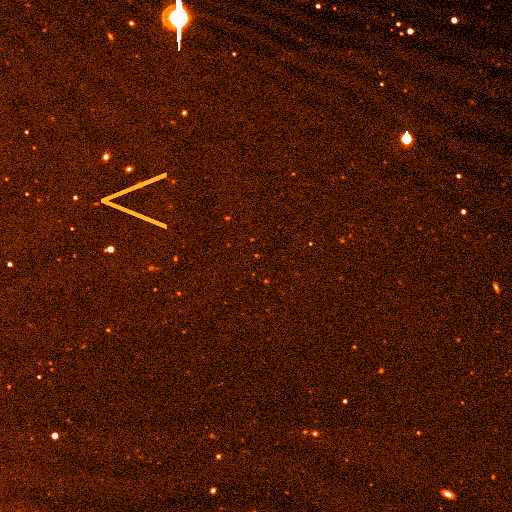Astrosciencechick

More Posts from Astrosciencechick and Others

The highly distorted supernova remnant shown in this image may contain the most recent black hole formed in the Milky Way galaxy. The image combines X-rays from NASA’s Chandra X-ray Observatory in blue and green, radio data from the NSF’s Very Large Array in pink, and infrared data from Caltech’s Palomar Observatory in yellow.
Credits: X-ray: NASA/CXC/MIT/L.Lopez et al; Infrared: Palomar; Radio: NSF/NRAO/VLA

Central Cygnus Skyscape via NASA https://ift.tt/2vgpcsn

Just let Earth enjoy the theory of general relativity, Mars.
P.S. Today (in 1905) the theory of special relativity was revealed!
Omg I’m dying
my favorite thing about the spanish harry potter translation is that instead of calling voldemort “the dark lord,” they call him señor tenebroso, which basically means “mr. spooky”


Eris is the most massive and second-largest dwarf planet in the known Solar System. Eris was discovered in January 2005 by a Palomar Observatory-based team led by Mike Brown, and its identity was verified later that year. In September 2006 it was named after Eris, the Greek goddess of strife and discord. Eris is the ninth most massive object directly orbiting the Sun, and the 16th most massive overall, because seven moons are more massive than all known dwarf planets.
Eris is a trans-Neptunian object (TNO) and a member of a high-eccentricity population known as the scattered disk. It has one known moon, Dysnomia. (Eris and Dysnomia are seen in the first image).
source
Hubble in Safe Mode as Gyro Issues are Diagnosed
NASA - Hubble Space Telescope patch. Oct. 8, 2018 NASA is working to resume science operations of the Hubble Space Telescope after the spacecraft entered safe mode on Friday, October 5, shortly after 6:00 p.m. EDT. Hubble’s instruments still are fully operational and are expected to produce excellent science for years to come. Hubble entered safe mode after one of the three gyroscopes (gyros) actively being used to point and steady the telescope failed. Safe mode puts the telescope into a stable configuration until ground control can correct the issue and return the mission to normal operation. Built with multiple redundancies, Hubble had six new gyros installed during Servicing Mission-4 in 2009. Hubble usually uses three gyros at a time for maximum efficiency, but can continue to make scientific observations with just one. The gyro that failed had been exhibiting end-of-life behavior for approximately a year, and its failure was not unexpected; two other gyros of the same type had already failed. The remaining three gyros available for use are technically enhanced and therefore expected to have significantly longer operational lives.
NASA’s Hubble Space Telescope. Image Credit: NASA
Two of those enhanced gyros are currently running. Upon powering on the third enhanced gyro that had been held in reserve, analysis of spacecraft telemetry indicated that it was not performing at the level required for operations. As a result, Hubble remains in safe mode. Staff at NASA’s Goddard Space Flight Center and the Space Telescope Science Institute are currently performing analyses and tests to determine what options are available to recover the gyro to operational performance. Science operations with Hubble have been suspended while NASA investigates the anomaly. An Anomaly Review Board, including experts from the Hubble team and industry familiar with the design and performance of this type of gyro, is being formed to investigate this issue and develop the recovery plan. If the outcome of this investigation results in recovery of the malfunctioning gyro, Hubble will resume science operations in its standard three-gyro configuration. If the outcome indicates that the gyro is not usable, Hubble will resume science operations in an already defined “reduced-gyro” mode that uses only one gyro. While reduced-gyro mode offers less sky coverage at any particular time, there is relatively limited impact on the overall scientific capabilities. For more information about Hubble, visit: https://www.nasa.gov/hubble Image (mentioned), Text, Credits: NASA/Sarah Loff/Felicia Chou. Greetings, Orbiter.ch Full article
Crew Safe After Soyuz Launch Abort
NASA astronaut Nick Hague and Russian cosmonaut Alexey Ovchinin are in good condition following an aborted launch of their Soyuz spacecraft.
The Soyuz MS-10 spacecraft launched from the Baikonur Cosmodrome in Kazakhstan to the International Space Station at 4:40 a.m. EDT Thursday, October 11 (2:40 p.m. in Baikonur) carrying American astronaut Nick Hague and Russian cosmonaut Alexey Ovchinin. Shortly after launch, there was an anomaly with the booster and the launch ascent was aborted, resulting in a ballistic landing of the spacecraft. Search and rescue teams were deployed to the landing site. Hague and Ovchinin are out of the capsule and are reported to be in good condition.
Note: This video is edited for length, but includes the launch, the initial report of the issue, and the confirmation that the crew landed safely.

Brown Dwarfs, or “Failing Stars”, in the Orion Nebula. Image credit: NASA, ESA, M. Robberto (Space Telescope Science Institute/ESA) and the Hubble Space Telescope Orion Treasury Project Team [3939x2955]
I’ll never tell 🤭
space edition - tag yourself
moonlight: sleep deprived af, genius ideas at 2:00 am, constantly underestimated, tangled earbuds, pretends like they don’t care but actually cares a lot, unscented candles
comet: will fight you for their friends, perfect eyeliner, doesn’t get angry but instead just fucking glares at you until you crumble, loves thunderstorms, cat person
stars: has no idea what they’re doing 167% of the time, artsy, likes halsey, string lights everywhere, loves fuzzy socks and blankets, probably wears space buns
alien: secretly is super good at makeup but doesn’t wear it often, lots of coffee, probably has a pet fish, reads young adult fantasy novels, closet conspiracy theorist, arms and papers always covered in doodles
black hole: 97% of their wardrobe is hoodies, professional procrastinator, can write, probably owns essential oils, eats ramen at 1:00 am, only writes in pen, actually really cool but doesn’t know it
spacedust: bath bombs, a+ insta feed, long flowy skirts and tops, city person, pretends to have their shit together, secretly loves kermit memes, probably dyed their hair at one point

NGC 6888: The Crescent Nebula
-
 lars-world reblogged this · 3 years ago
lars-world reblogged this · 3 years ago -
 aisling-josh-agus-shaun reblogged this · 5 years ago
aisling-josh-agus-shaun reblogged this · 5 years ago -
 st0p-thls-train liked this · 6 years ago
st0p-thls-train liked this · 6 years ago -
 milehigh8inch liked this · 6 years ago
milehigh8inch liked this · 6 years ago -
 november-venom liked this · 6 years ago
november-venom liked this · 6 years ago -
 pachelbelsheadcanon reblogged this · 6 years ago
pachelbelsheadcanon reblogged this · 6 years ago -
 parttwotriestowrite liked this · 6 years ago
parttwotriestowrite liked this · 6 years ago -
 wafflebloggies reblogged this · 6 years ago
wafflebloggies reblogged this · 6 years ago -
 y2bri liked this · 6 years ago
y2bri liked this · 6 years ago -
 lngdstncrnnr liked this · 6 years ago
lngdstncrnnr liked this · 6 years ago -
 dantesnferno liked this · 6 years ago
dantesnferno liked this · 6 years ago -
 dirtypaddler262 liked this · 6 years ago
dirtypaddler262 liked this · 6 years ago -
 bouncingintotrouble reblogged this · 6 years ago
bouncingintotrouble reblogged this · 6 years ago -
 sediesch reblogged this · 6 years ago
sediesch reblogged this · 6 years ago -
 sediesch liked this · 6 years ago
sediesch liked this · 6 years ago -
 czuleczko liked this · 6 years ago
czuleczko liked this · 6 years ago -
 no-komment liked this · 6 years ago
no-komment liked this · 6 years ago -
 greatercomplexity liked this · 6 years ago
greatercomplexity liked this · 6 years ago -
 brunoisethis liked this · 6 years ago
brunoisethis liked this · 6 years ago -
 drrrling liked this · 6 years ago
drrrling liked this · 6 years ago -
 analigital liked this · 6 years ago
analigital liked this · 6 years ago -
 deadacc0101 liked this · 6 years ago
deadacc0101 liked this · 6 years ago -
 lenny-kosnowski liked this · 6 years ago
lenny-kosnowski liked this · 6 years ago -
 stardustviolet reblogged this · 6 years ago
stardustviolet reblogged this · 6 years ago -
 bestofmartine liked this · 6 years ago
bestofmartine liked this · 6 years ago -
 ofcoffeeanddonuts reblogged this · 6 years ago
ofcoffeeanddonuts reblogged this · 6 years ago -
 ofcoffeeanddonuts liked this · 6 years ago
ofcoffeeanddonuts liked this · 6 years ago -
 exactlyweepingdefendor liked this · 6 years ago
exactlyweepingdefendor liked this · 6 years ago -
 fightermedic reblogged this · 6 years ago
fightermedic reblogged this · 6 years ago -
 fightermedic liked this · 6 years ago
fightermedic liked this · 6 years ago -
 makeanx liked this · 6 years ago
makeanx liked this · 6 years ago -
 hhbiscuit liked this · 6 years ago
hhbiscuit liked this · 6 years ago -
 critroledevotee reblogged this · 6 years ago
critroledevotee reblogged this · 6 years ago -
 only-book-lovers-left-alive reblogged this · 6 years ago
only-book-lovers-left-alive reblogged this · 6 years ago -
 only-book-lovers-left-alive liked this · 6 years ago
only-book-lovers-left-alive liked this · 6 years ago -
 thefabriccollective liked this · 6 years ago
thefabriccollective liked this · 6 years ago -
 poetry-protest-pornography liked this · 6 years ago
poetry-protest-pornography liked this · 6 years ago -
 hellovagirl liked this · 6 years ago
hellovagirl liked this · 6 years ago -
 brain liked this · 6 years ago
brain liked this · 6 years ago -
 theproblemwithstardust reblogged this · 6 years ago
theproblemwithstardust reblogged this · 6 years ago